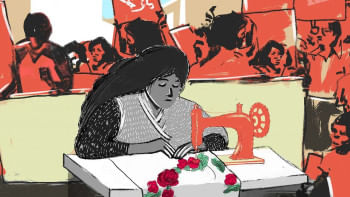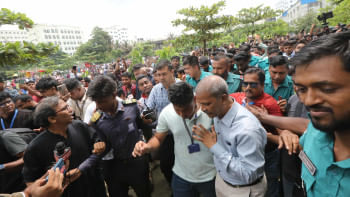Bangladesh’s youth should be empowered through skills and apprenticeship

Bangladesh stands at a critical juncture in its development journey. With over 60 percent of its population under the age of 35, the country holds immense promise in the form of a demographic dividend. However, realising this potential hinges not merely on job creation, but on equipping youth—especially those from disadvantaged backgrounds—with the skills, confidence, and opportunities needed to thrive in today's evolving labour market.
For many young Bangladeshis, particularly those who drop out of the formal education system early, the informal economy becomes the default destination. From tailoring and mechanics to mobile servicing and beauty care, these trades provide livelihoods but rarely offer structured training, career progression, or economic security. Without adequate support, these youth often remain trapped in low-paying, unstable jobs, despite their aspirations and energy.
In response to this challenge, the Recovery and Advancement of Informal Sector Employment (RAISE) project, implemented by the Palli Karma-Sahayak Foundation (PKSF) with support from the Government of Bangladesh and the World Bank, has emerged as a timely and transformative initiative. Designed to bridge the gap between education and employment, RAISE has introduced an integrated model that combines structured apprenticeship with life skills, financial literacy, and entrepreneurship support.
At the heart of the RAISE model is the "learn and earn" approach—an inclusive mechanism that allows youth to gain hands-on experience under trained mentors, known as Ostad, while earning a modest income. This approach is particularly vital for those who cannot afford to remain in traditional classrooms. By embedding technical training within real-world work environments, RAISE enables participants to develop not just job-specific expertise, but also essential life skills such as goal-setting, communication, adaptability, emotional intelligence, and leadership.
Life skills, often overlooked in technical programmes, are a central pillar of RAISE. In the informal sector, where job roles are fluid and interpersonal dynamics are key, attributes like teamwork, decision-making, and customer service frequently determine long-term success. Employers consistently note that while technical tasks can be taught on the job, it is soft skills, or the lack thereof, that most influence employee retention and performance. RAISE is addressing this gap.
Tens of thousands of youths, many from marginalised communities, participated in RAISE, doing apprenticeships in trades ranging from welding and refrigeration to tailoring and mobile servicing. Importantly, young women too are increasingly entering trades once dominated by men, supported by community engagement, flexible training schedules, and gender-sensitive counselling.
In communities where women's mobility and work outside the home were once restricted, trained young women are now earning, gaining respect within their families, and even mentoring others. This transformation is not only economic—it is social, psychological, and generational.
However, broader systemic gaps still exist that must be addressed. The informal sector still operates largely beyond the reach of formal skills development systems. Many small employers lack the capacity or incentive to train apprentices effectively. Training durations and content vary widely, and most master craftspersons have no formal pedagogical background.
What is needed now is national commitment and investment to scale what works. It is time for the government to take the lead in integrating such models into the national skills development ecosystem. A dedicated national apprenticeship framework, tailored to the informal economy, should be developed, with simplified processes for employer participation, financial incentives, community-level oversight, and quality assurance.
Training curricula must be developed in collaboration with industry actors and delivered through learner-friendly, engaging approaches. Life skills training should be made standard, not optional. Gender-sensitive design, including safe facilities and flexible schedules, must become the norm.
Digital tools can help youth access training content, track progress, and build portable, verifiable micro-credentials. These tools can also connect skilled youth with financial institutions, microenterprises, and startup support, creating pathways from learning to livelihood.
Equally crucial is the link between skills and entrepreneurship. But without access to capital, mentoring, or markets, the potential of trained youths remains untapped. Skills development must be linked with microfinance, business incubation, and value chain integration. The youth of Bangladesh are not just jobseekers, they are job creators in-waiting.
If Bangladesh is serious about becoming a resilient, inclusive, and middle-income country, investing in its youth must be more than a development slogan, it must be a national priority. Programmes like RAISE to boost productivity, reduce inequality, and empower citizens to lead change from within should be encouraged.
The path forward is clear. We must scale up what works. Institutionalise what has proven effective. And invest, unapologetically, in the dreams and capabilities of our young people. Because when we invest in youth, we invest in the future of Bangladesh.
Quazi Moshrur-Ul-Alam is programme manager at PKSF. He can be reached at [email protected].
Views expressed in this article are the author's own.
Follow The Daily Star Opinion on Facebook for the latest opinions, commentaries, and analyses by experts and professionals. To contribute your article or letter to The Daily Star Opinion, see our submission guidelines.

 For all latest news, follow The Daily Star's Google News channel.
For all latest news, follow The Daily Star's Google News channel. 










Comments